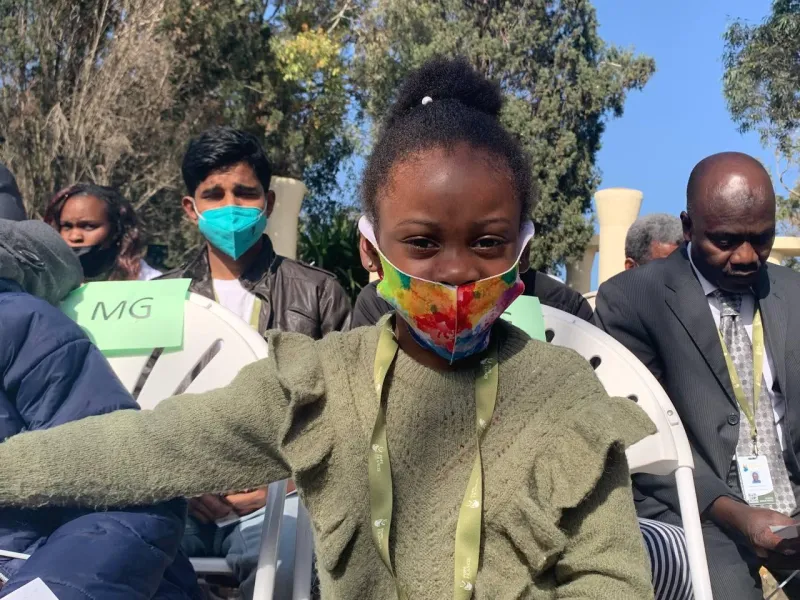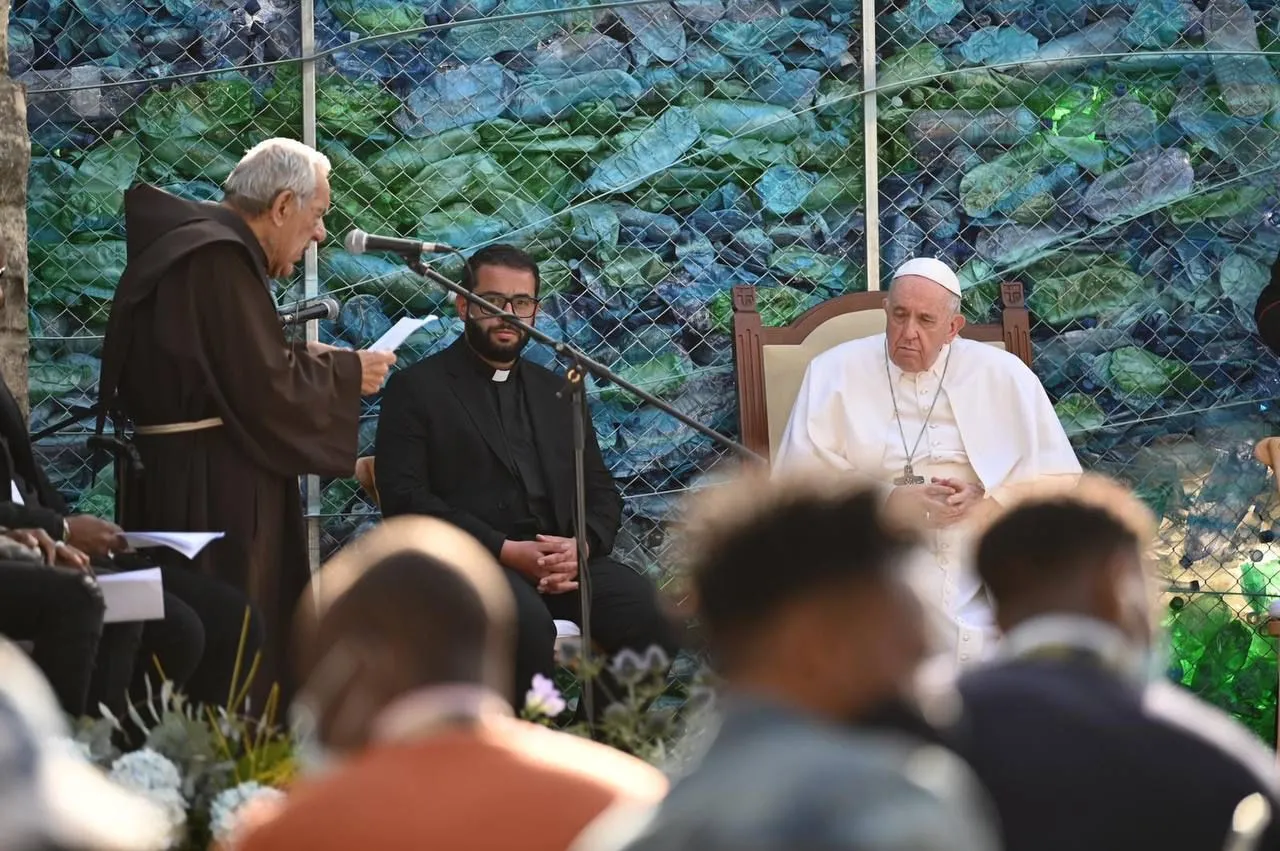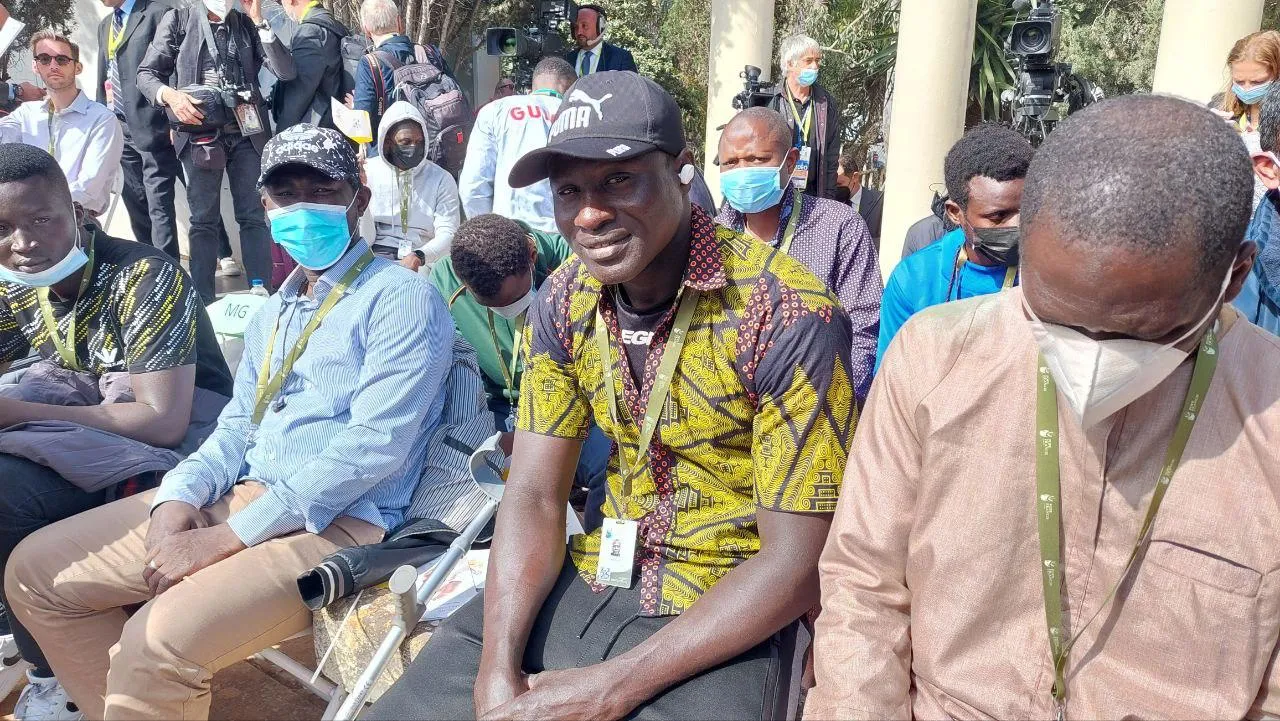
Hal Far, Malta, Apr 3, 2022 / 10:31 am (CNA).
Addressing a crowd on Sunday at the John XIII Peace Lab, an immigration reception center in Hal Far, Malta, Pope Francis called for strengthening “the fabric of social friendship and the culture of encounter, starting from places such as this.”
The Holy Father made his comments during an outdoor ceremony on the second and final day of his trip to the Mediterranean island nation. Seated in front of a display of crushed water bottles and life jackets migrants brought with them to Malta, Pope Francis began his address by recalling a message he gave from a refugee center on the Greek island of Lesbos in December 2021.
“Let me repeat what I said some months ago in Lesbos: ‘I am here … to assure you of my closeness. … I am here to see your faces and look into your eyes,’” he said to the crowd, which included approximately 200 migrant men, women, and children. “Since the day I visited Lampedusa, I have not forgotten you. You are always in my heart and in my prayers.”

After his arrival at 4:45 p.m. local time, Pope Francis was welcomed by Father Dionisio Mintoff, the founder of the peace lab, and then listened to two testimonies given by migrants at the center.
“None of us leave our homelands because of lack of love for our countries,” Siriman Coulibaly, a migrant who has been living at the center in Malta for four years and now has a pregnant wife, told the pope. “On the contrary, our journeys are journeys that start in hope of finding a safe space. We flee war, violent conflict, violations of human rights.”
In response to the man, the pope later said that those who are forced to leave their countries with dreams of freedom and democracy often experience a collision of their dreams with “a harsh reality, often dangerous, sometimes terrible and inhuman.”
Speaking directly to Coulibaly, he said, “You gave voice to the stifled plea of those millions of migrants whose fundamental rights are violated, sadly at times with the complicity of the competent authorities. And you drew attention to the most important thing: the dignity of the person.”
The Holy Father went on: “I would reaffirm this in your own words: you are not statistics but flesh and blood people with faces and dreams, dreams that are sometimes dashed,” he said.
According to the U.N. Refugee Agency, in recent years the refugee population arriving in Malta has been composed mostly of Libyan, Syrian, and Somali refugees. More than 800 migrants arrived in Malta by sea in 2021, a significant decrease from 2019 when 3,406 migrants arrived on Malta’s shores.
Unaccompanied children accounted for 24% of migrants arriving in Malta in 2020. These children mostly originated from Sudan, Somalia, Bangladesh, and Eritrea.
Many migrants arriving in Malta are seeking to get to other countries in mainland Europe.
Avoiding the ‘shipwreck of civilization’
Pope Francis told the migrants at Hal Far that his visit with them “makes us think of the significance of the logo chosen for my journey to Malta.”
That logo depicts hands lifted upwards towards a cross as they emerge from a boat being hit by waves.
The logo was inspired by the Apostle Paul’s shipwreck on the island of Malta, Pope Francis said, “which relates how the people of Malta welcomed him.”
He added: “We are told that they were treated with ‘unusual kindness.’ Not merely with kindness, but with rare humanity, a special care and concern that St. Luke wished to immortalize in the Book of Acts. It is my hope that that is how Malta will always treat those who land on its shores, offering them a genuinely ‘safe harbor.’”
Thousands of men, women, and children have experienced shipwreck in the Mediterranean sea in recent years, Pope Francis said, while noting that, “sadly” for many, it has resulted in fatalities.
Another kind of shipwreck can be seen taking place amidst these tragedies, Pope Francis said. And this is the “shipwreck of civilization, which threatens not only migrants but us all.”
The way in which we save ourselves from the shipwreck of civilization is “by conducting ourselves with kindness and humanity,” he said. We also save ourselves from shipwreck by regarding all men and women as brothers and sisters with their own life story instead of regarding them “merely as statistics.”
“By imagining that those same people we see on crowded boats or adrift in the sea, on our televisions or in the newspapers … could be any one of us,” we can save ourselves from shipwreck, he added.
Speaking to the crowd, Pope Francis said that the migrants’ experiences call to mind the exodus of the thousands who have been forced to leave Ukraine because of the war. But not only Ukraine, he added, “also the experiences of so many others in Asia, Africa, and the Americas who have had to leave their homes and lands in search of safety” as well.
“All of them are in my thoughts and prayers at this time,” he said.

Recalling testimony he received some time ago from a young man from the peace lab who was forced to leave his family, Pope Francis noted that the experience of being uprooted “leaves its mark.”
The mark doesn’t just result in the pain of the moment, but instead leaves a “deep wound affecting your journey of growth as a young man or woman,” he said.
He added: “It takes time to heal that wound; it takes time, and most of all, it takes experiences of human kindness: meeting persons who accept you and are able to listen, understand, and accompany you.”
The experience of “living alongside other traveling companions, sharing things with them and bearing your burdens together. This helps heal the wounds,” Pope Francis said.
‘Laboratories of peace’
The Holy Father said that it is important for reception centers such as the peace lab to be “places marked by human kindness.” He acknowledged the difficulty in making such a mark, since difficulties can create tensions.
“Yet, on every continent, there are individuals and communities who take up the challenge, realizing that migrations are a sign of the times, where civility itself is in play,” he said. The pope added that “for us Christians, too, in play is our fidelity to the Gospel of Jesus, who said: ‘I was a stranger and you welcomed me’ (Mt 25:35).”
“None of this can be accomplished in a day,” Pope Francis said. “It takes time, immense patience, and above all a love made up of closeness, tenderness and compassion, like God’s love for us.”
Pope Francis said: “Let us light fires of fraternity around which people can warm themselves, rise again and rediscover hope. Let us strengthen the fabric of social friendship and the culture of encounter, starting from places such as this. They may not be perfect, but they are, truly, ‘laboratories of peace.’”
Near the end of the ceremony, Pope Francis joined a migrant family in lighting candles before a statue of the Blessed Virgin Mary. After his visit to Hal Far concluded the pope was driven a short distance away to Malta International Airport for a farewell ceremony prior to his return to Rome.
If you value the news and views Catholic World Report provides, please consider donating to support our efforts. Your contribution will help us continue to make CWR available to all readers worldwide for free, without a subscription. Thank you for your generosity!
Click here for more information on donating to CWR. Click here to sign up for our newsletter.




Leave a Reply